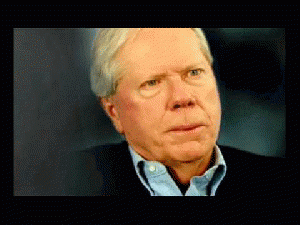Here's a book that presents its theses nimbly, deftly, consummately. Roberts can be as "elegant" as a mathematical proof, and as down-to-earth, colloquial, no-B.S. as a man who has walked the windy labyrinths of power, observing closely, "testing axioms on the pulses," and finding his own way to what works--and to Truth. Economics may be the "gloomy science" for most of its glum practitioners, but in Roberts' humanist hands, it's a scalpel to carve order from disorder--to framework the challenges of our precarious, modern, globalized world; to alert us to the dangers we face now, and the even graver threats ahead if we cannot restore real democracy, moral sensibility, and rational balance.
This youngish septuagenarian, who was Assistant Secretary of th e Treasury (under Reagan's "regime"), as well as an associate editor of the Wall Street Journal and a columnist there and at Business Week , regularly posts his work at the best progressive and "conservative" sites in the country--and, in fact, in the world. You can't tie Roberts to one ideology. (You can learn more about him at his website: http://www.paulcraigroberts.org/ .) What's clear is his commitment to understanding the mess we've made of our world, and re-visioning, rebuilding it. The last two paragraphs of this book sum up that commitment:
"Economist Herman Daly put it well when he wrote that the elites who make the decisions have figured out how to keep the benefits for themselves while 'sharing' the costs with the poor, the future, and other species."
"Empty-world economics with its emphasis on spurring economic growth by the accumulation of man-made capital has run its course. Full-world economics is steady-state economics, and it is past time for economists to get to work on a new economics for a full world."
"Empty-world economics" is Roberts' phrase for academic theorizing (often simplistic in spite of highfalutin' rhetoric) that ignores the complexities of a "full," entangled world, occupied by real human beings who suffer! In the economics of a full-world, "nature's capital (natural resources) and ability to absorb wastes are being exhausted." The "cost of nature's capital is not included in the computation." While Wall-Streeters, CEOs, and hedge-fund managers are awarded multi-million-dollar bonuses for "saving" billions of dollars in labor costs, they have, in actuality, merely "externalized" the costs--off-shoring millions of US jobs and fracturing the US tax base that used to support our education, our infrastructure, our culture, leaving the vast majority of Americans swimming in the swill of their excesses and pollution. These culprits have been "off-shoring" (outsourcing) all manner of jobs--low-tech and high-tech--while simultaneously "importing" foreign laborers to America on H-1b or L-1 work visas. American Labor gets the Big Squeeze while corrupt banks and corporations get the Big Hand-out.
In a fine, 20-page preface to Failure, German economist Johannes Maruschzik informs us that "the book is written by an independent thinker who is not afraid to question conventional wisdom." Roberts is closer to the libertarians than to those who think governments must run the economy. High tax rates discourage work and saving. But, "this historical turning point"--where the world is now--necessitates an agile intellect, and Maruschzik quotes from a letter Roberts had written him: "Libertarians think that human nature changes according to whether it is employed privately or publicly. They don't accept that private power can be just as abusive as public power. I appreciate libertarians' defense of liberty, but I have otherwise lost patience with them."
It's not that Roberts straddles the various theoretical economics fences, so much as the fact that he has been around long enough, witnessed critically enough, to know that human nature often has major "human" flaws. Markets are not self-regulating. They are "social institutions" and "the human actors in markets" require regulating." Libertarians need to be reminded that "liberty" is not anarchy. Business is also a kind of sport, but when the rules are not clear, and fairly enforced, abuses result, resentment grows, chaos manifests.
If libertarianism needs pruning, so does neo-liberal nonsense about the benefits of "free trade in the age of globalism." Western laissez faire capitalism has not been about producing "tradable" goods for "comparative" advantages. (That's how Adam Smith conceived of it: each country, each people, fashions or trades the products for which time and place have best suited them.) But, modern-day laissez faire capitalism has evolved into a system that seeks "absolute" advantage. Jobs are off-shored and costs of production are minimized because of "excess" labor pools in China, India, etc. The imbalances are egregious, and, according to a recent Oxfam report, we now have a world in which 85 people--imagine a small movie theater filled with 85 people!--have as much wealth as 3,500,000,000 people (half of the world's population!). Obviously, these disparities, these "externalized" costs cannot be sustained. (For one thing, in a world as interdependent as this one, how much can really be "externalized"? They breathe China's polluted air on America's west coast! And, there's a floating island of plastic as large as Texas, wafting in the Pacific.) Smith saw capitalism as a corrective to the abuses of monarchy and royalty. He was essentially a moralist, as is Roberts. Morality can be over-regulated (as centuries of Church doctrinarianism proved) and it can be "deregulated" until it is meaningless. How do we navigate between the extremes of doctrinarianism and anarchy? How do we achieve the proper balance?
We have been struggling with that question for decades. "The collapse of the Soviet Union in 1991 and the rise of the high-speed Internet have proved to be the economic and political undoing of the West," Roberts writes. "Financial deregulation, which began in the Clinton years and leaped forward during the George W. Bush regime, unleashed greed and debt leverage." Under neo-lib Clinton, the Glass-Steagall Act ("which had kept commercial and investment banking separated since 1933") was repealed. Mortgages were "bundled," given phony "ratings" by Wall Street-tight collaborating agencies, "securitized," and sold as derivatives over and over to Americans and foreigners who trusted the ratings and the reassurances of Wall Street casino operators. These "derivatives" were fraudulently insured by AIG and other companies, green-lighted by government "oversight" agencies, and our elected (selected?) representatives hobnobbed with the folks they were supposed to nab. When the "bubble" of absurdities burst, pensions burst, education funds evaporated, bridges collapsed. We live with that wreckage.
And, within the wreckage of an all-seeing, out-of-control Police/Surveillance/Military State clamping down on a disenfranchised and increasingly restive population. "In the 21st century, the U.S. economy has been kept going by an expansion in consumer debt, not by rises in consumers' real income," Roberts writes. The private Federal Reserve keeps "monetizing" debt (printing more money), and our "fiscal policies" are oriented towards spending more on military/surveillance/police-state actions--about of the U.S. budget--while, not so oddly, we live in a more dangerous world! What is wrong with this picture?
"The U.S. could reduce the budget deficit by hundreds of billions of dollars," Roberts writes, "by ending its pointless and illegal wars, by closing hundreds of overseas military bases, and by cutting an overstuffed military budget. This would require the U.S. to give up its goal of world hegemony."
Clearly, the collapse of the Soviet Union, and the rise of the Internet, has facilitated global trade and production, but these new conditions have also seeded the curse of Cain--the murderous desire for absolute control or "world hegemony." The perils are manifest: "the hubris of American elites might outlast the window of opportunity that exists for the renewal of the U.S. economy." That hubris may also outlast the opportunity to bring the world together under a new dispensation, where excess is curtailed and fairness is an honored precept. "The assault on common sense rules, which governed American capitalism and made it humane," writes Roberts, "resulted from the hubris created by the triumph of capitalism over Soviet communism." How can we check the mad hubris of this Orwellian world in which "war is peace, freedom is slavery, ignorance is strength"? In 2004, Roberts predicted that the U.S. would be a "third-world" nation (with impoverished masses and a bloated military) in just 20 years. We are now half-way there!
(Note: You can view every article as one long page if you sign up as an Advocate Member, or higher).






